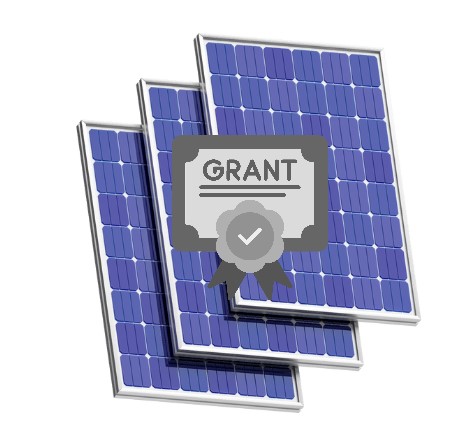Your basket is currently empty!
Written by
Top Business Solar Panel Grants: Boost Your Energy Efficiency Today

Looking for ways to fund solar panels for your business?
This guide details the best business solar panel grants available.
We’ll show you how to access government, local council, and private sector grants to reduce energy costs and enhance efficiency.
Key Takeaways
- Solar panel grants are essential for businesses seeking to transition to renewable energy, reduce operational costs, and enhance sustainability.
- Various funding options exist, including government-funded programs, local council initiatives, and private sector loans, all aimed at supporting solar panel installations.
- Successful grant applications require thorough research, comprehensive documentation, and proactive follow-up to maximise funding opportunities for solar projects.
Overview of Solar Panel Grants for Businesses

Solar panel grants are vital for supporting businesses in their transition to renewable energy sources.
These grants not only help improve energy efficiency but also significantly reduce operational costs.
Accessing available funding opportunities allows businesses to enhance profitability and contribute to broader sustainability goals.
Many businesses are increasingly turning to solar panel installations as part of their energy efficiency measures such as warehouse solar panel installations.
This trend is supported by various types of grants, including government-funded programs, local council initiatives, and private sector funding opportunities.
Knowing the different sources of funding and how to access them is key for any business investing in solar technology.
From small business energy grants to more substantial government funding, these grants can be the key to unlocking significant savings on energy bills and optimising energy usage.
Exploring these options helps businesses find the right financial support to transition to solar energy and achieve a more sustainable future.
Government-funded Solar Panel Grants
Government-funded solar panel grants are designed to promote the adoption of renewable energy among businesses through various financial support mechanisms.

The UK government has allocated nearly £5 billion to assist businesses in adopting greener practices and technologies.
These grants often come with specific eligibility criteria and application requirements, so businesses must familiarise themselves with these details to increase their chances of success.
Programs like the Net Zero Grant Programme in Birmingham offer targeted financial support for small and medium-sized enterprises to implement energy-saving solutions.
Businesses can find information on available grants by researching government websites and consulting with energy suppliers.
Local Council Solar Panel Initiatives
Local councils play a significant role in supporting businesses to reduce their environmental footprints and lower energy expenses. These grants are aimed at local businesses and are often part of broader initiatives to promote sustainability within the community.
Businesses can check their local authority’s website or contact them directly to find out about available funding opportunities.
For example, regional environmental agencies and non-profits can provide valuable information on specific grants available in different areas.
These resources enable businesses to identify and apply for the most suitable local council grants for their solar panel projects.
Private Sector Solar Panel Funding

In addition to government and local council funding, private organisations also offer various funding options to assist businesses with solar panel installations and related projects.
These can include loans specifically aimed at sustainable business initiatives, such as the Green Loans offered by NatWest.
Leveraging private sector funding enhances a business’s ability to invest in renewable energy technologies like solar panels.
This financial support can significantly complement traditional grant systems and provide additional resources for businesses to achieve their energy efficiency goals.
Key National Solar Panel Grant Programs
National solar panel grant programs offer significant financial benefits to businesses through energy efficiency measures.
These programs are designed to reduce energy costs and improve operational efficiency, making them an attractive option for businesses looking to invest in solar technology.
Here are some key national programs that can help businesses achieve their sustainability goals.
Smart Export Guarantee (SEG)
The Smart Export Guarantee (SEG) is a government scheme that compensates businesses for the excess solar energy they feed back into the National Grid.
To participate in this program, businesses must have a smart meter installed.
Typically, businesses can earn around 5p per kWh exported under the SEG, providing a valuable return on their solar investment.
Industrial Energy Transformation Fund (IETF)
The Industrial Energy Transformation Fund (IETF) primarily supports projects that enhance energy efficiency and facilitate the shift to low carbon technologies for industry.
This fund also covers feasibility studies before making an investment decision, ensuring that businesses make informed choices about their energy investments.
Renewable Heat Incentive (RHI)
The Renewable Heat Incentive (RHI) provides financial support for businesses to install renewable heat technologies, including solar thermal systems.
This initiative not only helps businesses reduce their carbon emissions but also offers financial incentives to make the transition to renewable energy more accessible.
Regional Solar Panel Grants for Businesses
In addition to national programs, various regional grants are available to support businesses in their solar panel installations.
These grants are tailored to the specific needs and opportunities within different parts of the UK, offering targeted support for businesses in Scotland, Wales, and Northern Ireland.
Scotland
The Scottish government offers a range of support for businesses seeking funding for solar panel installations, including the SME Loan Scheme.
Under this scheme, businesses can apply for loans of up to £100,000, with cashback grants of up to £30,000, making it a viable option for many UK businesses looking to invest in renewable energy.
Wales
In Wales, the Green Business Loan Scheme offers businesses discounted interest rates and flexible repayment options.
This scheme, supported by the Development Bank of Wales and the Welsh government, provides financial support and expert advice on decarbonisation methods, making it easier for businesses to invest in sustainable technologies.
Northern Ireland
The Northern Ireland Sustainable Energy Programme allocates £8 million to increase energy efficiency for businesses.
Supported by the Northern Irish Executive and the Energy Saving Trust, this program aims to improve energy efficiency across businesses in Northern Ireland, making it a significant opportunity for local businesses to reduce their energy bills and carbon footprint.
Financial Support Options Beyond Grants
Beyond traditional grants, there are several financial support options available to businesses looking to invest in solar panels.
These include asset finance, Power Purchase Agreements (PPAs), and tax incentives and capital allowances, providing a comprehensive suite of funding options to support renewable energy investments.
Asset Finance for Solar Panels
Asset finance helps businesses acquire equipment like solar panels through structured repayment plans, often improving cash flow.
With options like the Smart Ease payment plan, which requires £0 upfront and features a fast application process, businesses can immediately benefit from energy savings.
Power Purchase Agreements (PPAs)
A Power Purchase Agreement (PPA) allows businesses to benefit from solar energy without upfront costs.
The provider installs and maintains the solar equipment, and the business pays for the electricity generated at a rate typically lower than standard utility prices.
This arrangement allows businesses to save on energy bills without the responsibilities of ownership and maintenance.
Tax Incentives and Capital Allowances
Capital allowances enable businesses to reduce taxable profits by deducting qualifying investment costs related to solar installations.
The Enhanced Capital Allowance scheme allows businesses to write off the costs of energy-efficient equipment against taxable profits, providing a significant financial incentive for investing in renewable energy technologies.
Applying for Solar Panel Grants: A Step-by-Step Guide
Applying for solar panel grants can seem daunting, but a structured approach can simplify the process.
This guide helps you identify eligible grants, prepare a strong application, and manage post-application steps effectively to secure funding for your solar projects.
Identifying Eligible Grants
Finding the right business grants for your business involves thorough research. Information on available grants can be found on the gov.uk page and by contacting energy suppliers.
Applications for the Industrial Energy Transformation Fund are open until April 2024, providing a significant funding opportunity for eligible businesses.
Preparing Your Application
A strong grant application is crucial for securing funding for solar panel installations.
Start by gathering required documents such as financial statements, project plans, and preliminary feasibility studies.
Research available grants thoroughly to ensure they align with your business’s goals and eligibility criteria.
Avoid common pitfalls like missing deadlines or failing to provide adequate information in the supporting documents.
Post-Application Steps
After submitting your application, follow up with the grant provider to inquire about its status and gather any feedback they might have.
Once you receive the grant funds, maintain detailed records of all expenditures and use the funds as outlined in your original application to remain compliant with grant conditions.
Success Stories: Businesses Benefiting from Solar Panel Grants
Real-life success stories showcase the tangible benefits businesses experience from solar panel grants.
These stories not only showcase financial savings but also reflect a growing commitment to sustainability among businesses.
Let’s look at some specific examples.
Case Study: Small Business in Birmingham
Through the Net Zero Grant Programme, a small business in Birmingham received up to £100,000 in funding to implement solar panel installations.
This investment significantly reduced their energy costs and enhanced their sustainability, setting a positive example for other local businesses.
Case Study: SME in Norfolk
An SME in Norfolk utilised the New Anglia grant to install solar panels, significantly enhancing their energy efficiency and sustainability.
This investment not only improved their financial bottom line but also set a precedent for other businesses in the region considering similar endeavors.
Summary
Solar panel grants offer a valuable opportunity for businesses to reduce energy costs and contribute to sustainability goals.
By understanding the various types of grants available, from government-funded programs to local council initiatives and private sector funding, businesses can find the right financial support to achieve their energy efficiency objectives.
In addition to grants, alternative financial support options such as asset finance, Power Purchase Agreements (PPAs), and tax incentives provide comprehensive solutions for investing in renewable energy technologies.
By following a structured approach to applying for these grants and learning from the success stories of other businesses, you can make a significant impact on your company’s sustainability and profitability.
Frequently Asked Questions
Can i get solar panels for free?
You may be able to obtain solar panels for free if you belong to a low-income, vulnerable, and fuel-poor household, and have an inefficient heating system.
Programs like ECO4 can provide grants under these conditions.
Can I claim solar panels as a business expense UK?
Yes, you can claim solar panels as a business expense in the UK through the Annual Investment Allowance (AIA), enabling tax relief on the cost.
Are solar panels worth it for a business?
Solar panels are worth investing in for a business, as they enhance your sustainability efforts and can attract environmentally conscious customers.
Additionally, they contribute to long-term cost savings on energy expenses.
Can businesses get a grant for solar panels?
Yes, businesses can obtain grants for solar panels through various programs, such as the Low Carbon Project, which provides financial contributions for energy-saving initiatives.
It is advisable to explore available grant schemes that support renewable energy investments.
What types of solar panel grants are available for businesses?
Businesses can access a range of solar panel grants, including government-funded programs, local council initiatives, and private sector funding options.
These grants provide crucial financial support for implementing solar energy solutions.
Written by
Start Your Solar Project Today
Our Biggest Discounts are With Our Experts – Speak to Us Today!
We price match too!
What is in this article?
- Key Takeaways
- Overview of Solar Panel Grants for Businesses
- Key National Solar Panel Grant Programs
- Regional Solar Panel Grants for Businesses
- Financial Support Options Beyond Grants
- Applying for Solar Panel Grants: A Step-by-Step Guide
- Success Stories: Businesses Benefiting from Solar Panel Grants
- Summary
- Frequently Asked Questions





